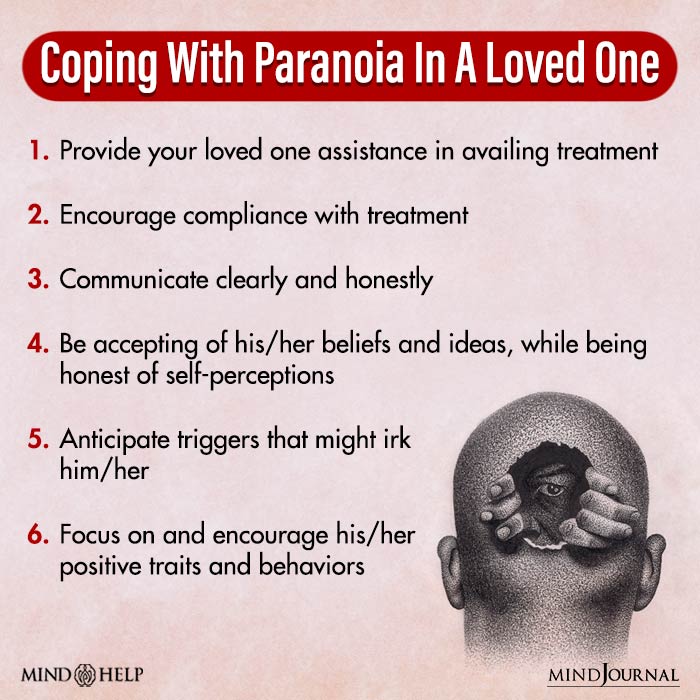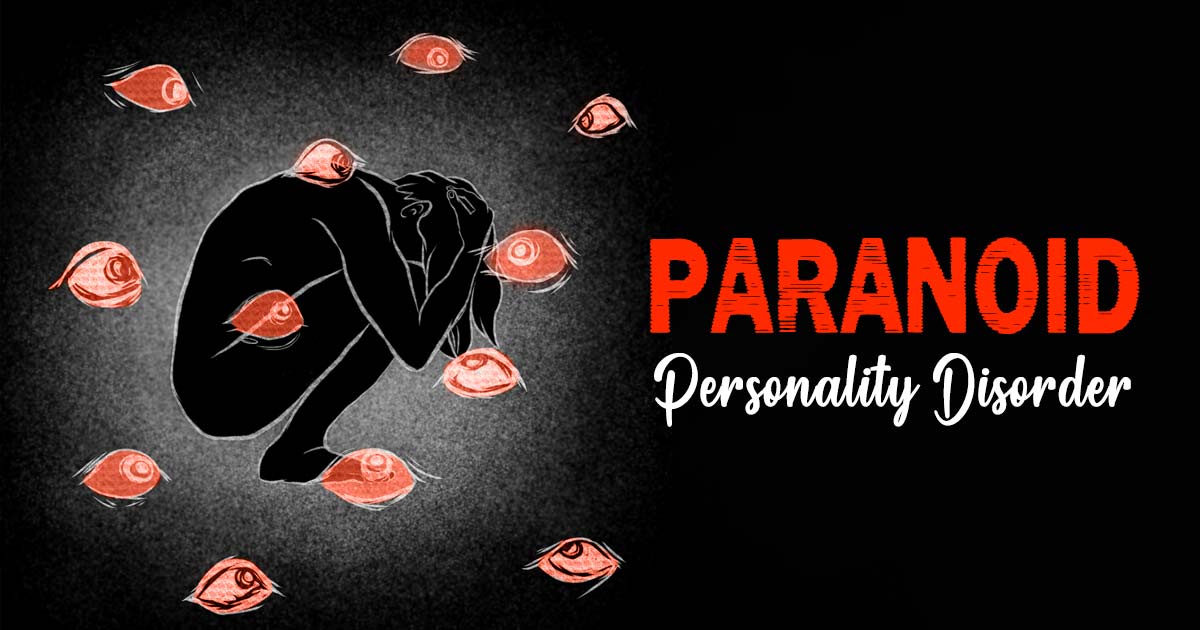Paranoid personality disorder (PPD) is a mental health condition characterized by excessive and unwarranted paranoia and suspicion of others.
What Is Paranoid Personality Disorder (PPD)?
Paranoid personality disorder (PPD) is a mental health condition marked by a long-term pattern of mistrust and suspicion of others without adequate reason. A person with this condition experiences persistent and pervasive mistrust 1 Lee R. (2017). Mistrustful and Misunderstood: A Review of Paranoid Personality Disorder. Current behavioral neuroscience reports, 4(2), 151–165. https://doi.org/10.1007/s40473-017-0116-7 and suspicion of others. He/she also develops an extremely pessimistic and profoundly cynical view of others and the world.
Paranoid personality disorder has been recognized in the DSM-5 (Diagnostic and Statistical Manual of Mental Disorders, fifth edition). It has been classified as a psychotic personality disorder 2 Esterberg, M. L., Goulding, S. M., & Walker, E. F. (2010). Cluster A Personality Disorders: Schizotypal, Schizoid and Paranoid Personality Disorders in Childhood and Adolescence. Journal of psychopathology and behavioral assessment, 32(4), 515–528. https://doi.org/10.1007/s10862-010-9183-8 involving delusions and dysfunctional and maladaptive personality characteristics, rather than a cognitive or mood disorder.
Living with paranoid personality disorder
People with PPD have warped views of the world and extreme suspicion of others around them. They also tend to be solitary, self-sufficient, and secretive all the time—distrusting others’ loyalty. Their paranoid perceptions, grudges, and biased allegations can eclipse everything else—isolating them from their friends and family.
They can get angry easily and experience frequent and persistent conflict in their intimate relationships and friendships. Most often, they have trouble operating with others in the workplace, educational or social settings.
People with PPD are also known to be vulnerable to severe mental health disorders 3 Lee R. (2017). Mistrustful and Misunderstood: A Review of Paranoid Personality Disorder. Current behavioral neuroscience reports, 4(2), 151–165. https://doi.org/10.1007/s40473-017-0116-7 like:
- Obsessive-compulsive disorder (OCD) [Read more]
- Schizo-affective disorders
- Social anxiety disorder [Read more]
- Substance-related disorders
- Other Personality Disorders, etc. [Read more]
Prevalence Of Paranoid Personality Disorder (PPD)
Paranoid personality disorder (PPD) is a relatively rare mental health condition prevalent among 0.5–2.5% 4 Akhtar S. (1990). Paranoid personality disorder: a synthesis of developmental, dynamic, and descriptive features. American journal of psychotherapy, 44(1), 5–25. https://doi.org/10.1176/appi.psychotherapy.1990.44.1.5 of the general population. It reportedly affects women more than it affects men 5 Lee R. (2017). Mistrustful and Misunderstood: A Review of Paranoid Personality Disorder. Current behavioral neuroscience reports, 4(2), 151–165. https://doi.org/10.1007/s40473-017-0116-7 . The signs of paranoid personality disorder usually set in by the late teens or early adult years.
Case Example
Sameer newly joined an institution in Assam for pursuing a Ph.D. degree. Since childhood, he has had an inability to believe others around him. Growing up, he found people to be very threatening and suspicious.
So, he decided to live and study away from his hometown, Kolkata. Initially, he got the aid of his classmates in securing accommodation and settling in at school. But, after about 7-10 days, he started doubting them. He was convinced that they were quite disloyal, dreading that they might betray him someday. His newly-made friends, however, were at no fault and they talked to him naturally. But whenever he saw them talking together at a distance, he inferred they were conspiring against him.
Sameer also had a girlfriend back home. The physical long distance between them meant that they couldn’t meet or spend time frequently, leaving Sameer to think that she was cheating on him. He also kept getting negative thoughts about his Ph.D. guide. When instructed to do something or given feedback, he thought his guide wanted to humiliate him in front of everyone and damage his career. Sameer also strongly felt that he needed to take drastic actions against such harmful people around him.
Case Analysis
It is evident from the present case that Sameer has held suspicious beliefs about people around him since the early days of his life. His current behavior reflects how he is interpreting usual conversations as threatening and unreasonably finding people to be unfaithful and jealous.
Most of the time, he is holding grudges against others and, in the absence of clear evidence, he is believing that his reputation is about to be assailed in the near future. All of this behavior reflects significant signs of paranoid personality disorder (PPD).
Read More About Paranoid Schizophrenia Here
Symptoms Of Paranoid Personality Disorder
Research attributes the common paranoid personality disorder symptoms to the following:
- Having extremely delusional and self-aggravating grandiose ideas
- Extreme distrust and suspicion of others and their motives
- Unjustified belief that others are trying to harm or deceive you
- Unjustified suspicion
- Unreasonable hesitancy to confide in others
- Perception of innocent remarks or non-threatening situations as personal insults or attacks
- Excessive sensitivity to setbacks and rebuffs
- Angry or hostile reaction to perceived slights or insults
- Tendency to hold grudges
- Unjustified, recurrent suspicion that one’s romantic partner is unfaithful
Loving Someone With Paranoid Personality Disorder (PPD)
Living with and loving someone with paranoid personality disorder is also not easy. If you have a loved one with paranoid personality disorder, you may feel:
- Frustrated by their negative views of the world
- Exhausted by their continual accusations and questioning of your loyalty
- Beaten down by their hostility and stubbornness
- An endless struggle in maintaining close or meaningful relationships with the affected person
You may also feel that they are deliberately exaggerating the negative aspects of any situation or conversation. Studies show that family and friends of people with PPD often experience stress, isolation, grief, and depression.
Causes Of Paranoid Personality Disorder (PPD)
The common causes 6 Raihani, N. J., & Bell, V. (2019). An evolutionary perspective on paranoia. Nature human behaviour, 3(2), 114–121. https://doi.org/10.1038/s41562-018-0495-0 of paranoid personality disorder (PPD) include:
- A family history of schizophrenia and delusional disorder
- Emotional neglect
- Experiences of trauma
- Parental abuse and supervision neglect in childhood
- Having personality traits like self-insecurity, paranoia, neuroticism, etc.
- Experiences of socio-economic discrimination (such as racism, poverty, etc.)
Diagnosis Of Paranoid Personality Disorder (PPD)
A mental healthcare professional (MHPs) conducts a differential diagnosis of a person showing the symptoms of paranoid personality. The patient’s levels of anxiety, paranoia, and impulse control in different states of mind are also assessed with different paranoid personality disorder tests [such as the Paranoid Personality Disorder Features Questionnaire (PPDFQ) 7 Edens, J. F., Marcus, D. K., & Morey, L. C. (2009). Paranoid personality has a dimensional latent structure: taxometric analyses of community and clinical samples. Journal of abnormal psychology, 118(3), 545–553. https://doi.org/10.1037/a0016313 ].
A detailed explanation of his/her social, medical, as well as psychiatric histories is taken, before formulating an effective treatment plan.
Treatment For Paranoid Personality Disorder
Paranoid personality disorder treatment 8 Bernstein, D., & David Useda, J. (n.d.). Paranoid Personality Disorder. Retrieved October 13, 2022, from https://us.sagepub.com/sites/default/files/upm-assets/15198_book_item_15198.pdf usually comprises a combination of therapies and social skills training techniques. In rare cases, pharmacological treatment is also administered.
1. Psychotherapies
A large number of psychotherapies are readily available to correct the affected individuals’ maladaptive behavior and thought patterns and help him/her develop healthy coping strategies. The therapist can also help him/her improve social interaction, communication, and self-esteem. The following therapies include:
- Talk therapy
- Cognitive-behavioral therapy (CBT) [Read more]
- Dialectical-behavior therapy (DBT)
Read More About Psychotherapy Here
2. Social skills training
People living with paranoid personality disorder can also avail several social skills training techniques directed at trust and rapport-building. This may also include anger management and conversational skills.
3. Pharmacotherapy
Medication is rarely administered to people seeking treatment for paranoid personality disorder. But, in rare cases, pharmacological treatment is employed alongside psychotherapies. Anti-anxiety, antidepressant, and antipsychotic medications 9 Völlm, B. A., Farooq, S., Jones, H., Ferriter, M., Gibbon, S., Stoffers, J., Duggan, C., Huband, N., & Lieb, K. (2011). Pharmacological interventions for paranoid personality disorder. The Cochrane database of systematic reviews, (5), CD009100. https://doi.org/10.1002/14651858.CD009100 , for instance, are commonly used to treat PPD.
How To Deal With Paranoid Personality Disorder
If you are or you know someone who is experiencing paranoid personality disorder symptoms, consider seeking medical attention. Try following these measures to better cope with the symptoms of this mental health condition.
- Encourage compliance with treatment and effective communication with the therapist and social support system.
- Educate yourself about the mental health disorder and develop an understanding of its triggers, treatment, etc.
- Promote simplified interactions, empathy, and understanding.
- Respect boundaries and seek a balanced interaction.
- Allow yourself or the other person to heal.

Takeaway
Paranoid personality disorder can be extremely crippling. A timely and proper diagnosis will ensure that the sufferer gets to address its signs and symptoms early on. It is also essential to remember that the path of recovery and personal care isn’t a straight line, so don’t let discouragement take over when you struggle.
At A Glance
- Paranoid personality disorder (PPD) is a mental health condition marked by excessive paranoia and suspicion of others, without reason.
- The characteristics of paranoid personality disorder include mistrust, grandiosity, unjustified suspicion, persecutory belief, antagonism, etc.
- It affects 0.5–2.5% of the global population.
- If left untreated, PPD can have a negative impact on the sufferer’s personal and professional lives.
- Paranoid personality disorder can be timely addressed with psychotherapies, social skills training, and medication.
Frequently Asked Questions (FAQs)
1. Who are some famous people with paranoid personality disorder?
Richard Nixon, Adolf Hitler, Josef Stalin, and Saddam Hussein are some famous people with paranoid personality disorder.
2. How do you treat paranoid personality disorder naturally?
Paranoid personality disorder cannot be treated naturally and can only be addressed with adequate therapy and medication.
3. How do you help someone with paranoid personality disorder?
Paranoid beliefs can make people feel isolated and helpless. To help someone with paranoid personality disorder, try talking to him/her openly and reassuring them with different perspectives in life.















